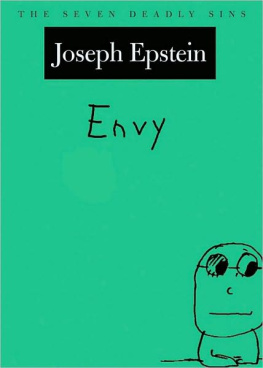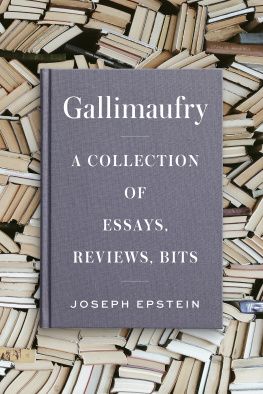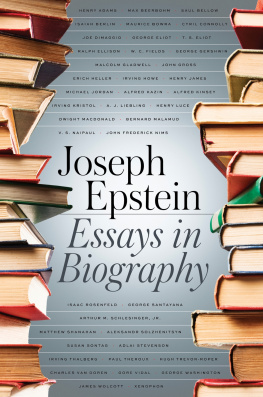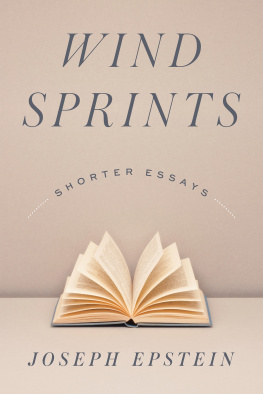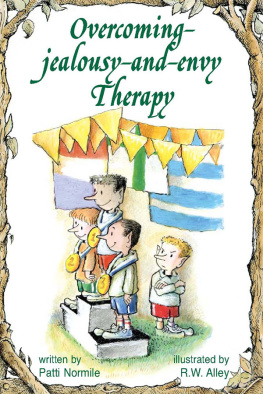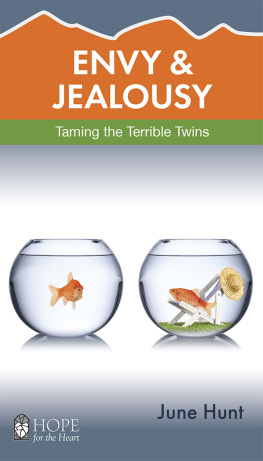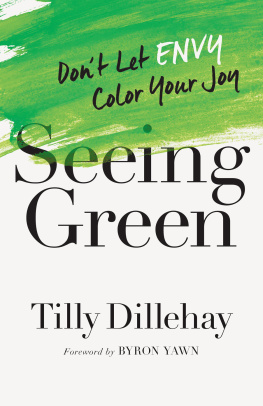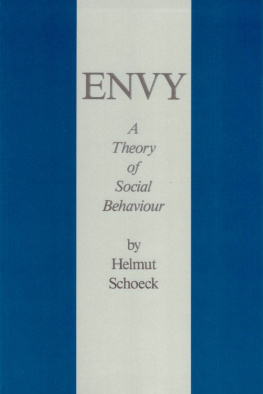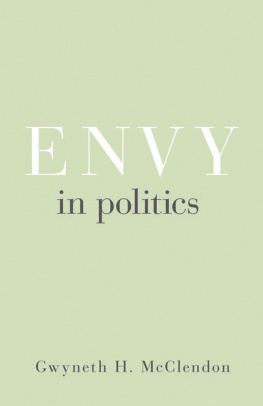CHAPTER ONE
Not Jealousy
Of the seven deadly sins, only envy is no fun at all. Sloth may not seem much fun, nor anger either, but giving way to deep laziness has its pleasures and the expression of anger entails a release that is not without its small delights. In recompense, envy may be the subtlestperhaps I should say the most insidiousof the seven deadly sins. Surely it is the one that people are least likely to want to own up to, for to do so is to admit that one is probably ungenerous, mean, small-hearted. It may also be the most endemic. Apart from Socrates, Jesus, Marcus Aurelius, Saint Francis, Mother Teresa, and only a few others, at one time or another, we have all felt flashes of envy, even if in varying intensities, from its minor pricks to its deep, soul-destroying, lacerating stabs. So widespread is ita word for envy, I have read, exists in all known languages that one is ready to believe it is the sin for which the best argument can be made that it is part of human nature.
Is envy a feeling, an emotion, a sin, a temperamental disposition, or a world-view? Might it also be a Rorschach test: tell what you envy and you reveal a great deal about yourself. It can be all of these thingsand more. No one would doubt that, whatever else it is, envy is certainly a charged, indeed a supercharged, word: one of the few words left in the English language that retains the power to scandalize. Most of us could still sleep decently if accused of any of the other six deadly sins; but to be accused of envy would be seriously distressing, so clearly does such an accusation go directly to character. The other deadly sins, though all have the disapproval of religion, do not so thoroughly, so deeply demean, diminish, and disqualify a person. Not the least of its stigmata is the pettiness implicit in envy.
The Websters definition of the word wont quite do: (1) Obs. malice; (2) painful or resentful awareness of the advantage enjoyed by another joined with a desire to possess the same advantage. The Oxford English Dictionary is rather better: it defines envy first as malignant or hostile feeling; ill-will, malice, enmity, and then as active evil, harm, mischief, both definitions accounted Obscure. But the great OED only gets down to serious business in its third definition, where it defines envy as the feeling of mortification and ill-will occasioned by the contemplation of superior advantages possessed by another, in which usage the word envy first pops up around 1500. It adds a fourth definition, one in which the word is used without notions of malevolence, and has to do with the (a) desire to equal another in achievement, or excellence; emulation, and (b) speaks to a longing for the advantages enjoyed by another person. Aristotle, in The Rhetoric, writes of emulation as good envy, or envy ending in admiration, and thus in the attempt to imitate the qualities one began by envying. Yet it must be added that envy doesnt generally work this way. Little is good about envy, except shaking it off, which, as any of us who have felt it deeply knows, is not so easily done.
Both the OED and Websters definitions are inattentive to the crucial distinction between envy and jealousy. Most people, failing to pick up the useful distinction between envy and jealousy, mistakenly use the two words interchangeably. I suspect people did not always do so. H. W. Fowler, in his splendid Modern English Usage of 1926, carries no entry on either word, suggesting that formerly there was no confusion. Bryan A. Garner, in his 1998 Dictionary of American Usage, says that the careful writer distinguishes between these terms, but does not himself do so sufficiently. He writes that jealousy is properly restricted to contexts involving affairs of the heart, envy is used more broadly of resentful contemplation of a more fortunate person.
With the deep pedantic delight one takes in trumping a recognized usage expert, it pleases me to say, Not quite so. The real distinction is that one is jealous of what one has, envious of what other people have. Jealousy is not always pejorative; one can after all be jealous of ones dignity, civil rights, honor. Envy, except when used in the emulative sense mentioned by Aristotle, is always pejorative. If jealousy is, in cliche parlance, spoken of as the green-eyed monster, envy is cross-, squinty-, and blearily red-eyed. Never, to put it very gently, a handsome or good thing, envy.
Although between jealousy and envy, jealousy is often the more intensely felt of the two, it can also be the more realistic: one is, after all, sometimes correct to feel jealousy. And not all jealousy plays the familiar role of sexual jealousy. One may be jealousagain, rightlyof ones reputation, integrity, and other good things. One is almost never right to feel envy: to be envious is to be, ipso facto, wrong.
Apart from emulative envy, the only aspect of envy that does not seem to me pejorative is a form of envy I have myself felt, as I suspect have others who are reading this book: the envy that I think of as faith envy. This is the envy one feels for those who have the true and deep and intelligent religious faith that sees them through the darkest of crises, death among them. If one is oneself without faith and wishes to feel this emotion, I cannot recommend a better place to find it than in the letters of Flannery OConnor. There one will discover a woman still in her thirties, who, after coming into her radiant talent, knows she is going to die well before her time and, owing to her Catholicism, faces her end without voicing complaint or fear. I not long ago heard, in Vienna, what seemed to me a perfect rendering of Beethovens Ninth Symphony, and was hugely moved by it, but how much more would I have been moved, I could not help wonder, if I were in a state of full religious belief, since the Ninth Symphony seems to me in many ways a religious work. Faith envy is envy, alas, about which one can do nothing but quietly harbor it.
Envy must also be distinguished from general yearning. One sees people at great social ease and wishes to be more like them; or feels keenly how good it would be once more to be young; or longs to be wealthier; or pines to be taller, thinner, more muscular, less awkward, more beautiful generally. All this is yearning. Envy is never general, but always very particularat least envy of the kind one feels strongly.
The envious tend to be injustice collectors. Envy, among other ingredients, has a love of justice in it, William Hazlitt wrote. We are more angry at undeserved than at deserved good fortune. Something to it, but, my sense is, not all that much. Yet much more often than not envy expresses feelings more personal than the love of justice. In another useful distinction, Kierkegaard in The Sickness unto Death wrote that admiration is happy self-surrender; envy is unhappy self-satisfaction. Envy asks one leading question: What about me? Why does he or she have beauty, talent, wealth, power, the worlds love, and other gifts, or at any rate a larger share of them than I? Why not me?
Dorothy Sayers, in a little book on the seven deadly sins, writes: Envy is the great leveler: if it cannot level things up, it will level them down.... At its best, Envy is a climber and a snob; at its worst it is a destroyerrather than have anyone happier than itself, it will see us all miserable together. A selfpoisoning of the mind, envy is usually less about what one lacks than about what other people have. A strong element of the begrudging resides in envy, thus making the envious, as Immanuel Kant remarked in The Metaphysics of Morals, intent on the destruction of the happiness of others.
One might call someone or somethinganothers family life, health, good fortuneenviable without intending rancor. In the same way, one might say, I envy you your two-month holiday in the south of France, without, in ones mind, plotting how to do the person out of it. Or one might say, I dont envy him the responsibilities of his job, by which one merely means that one is pleased not to have anothers worries. There probably ought to be a word falling between envy and admiration, as there ought to be a word that falls between talent and genius. Yet there isnt. The language is inept.
Next page
